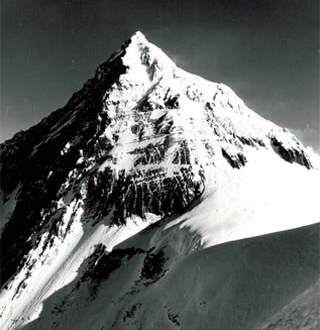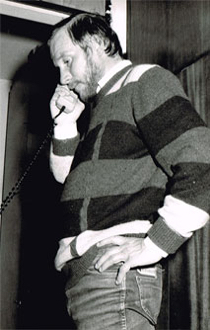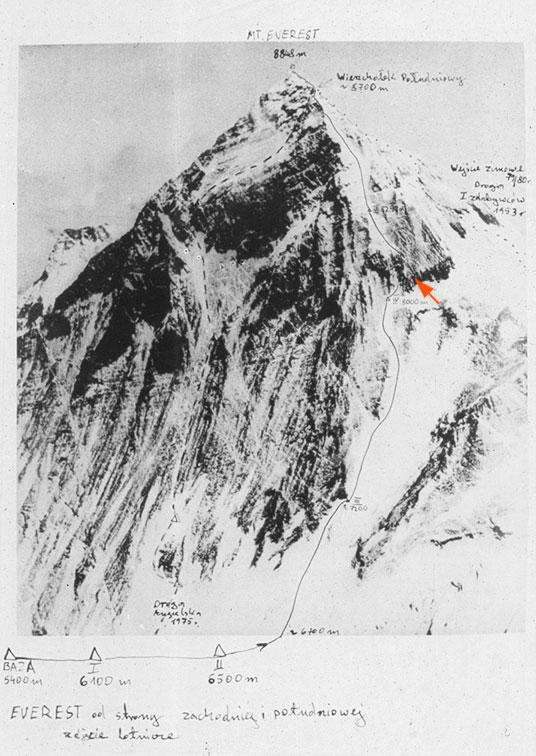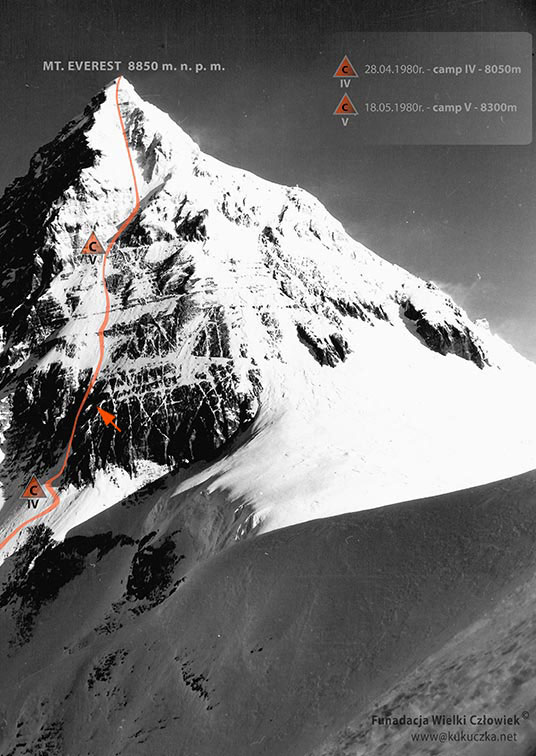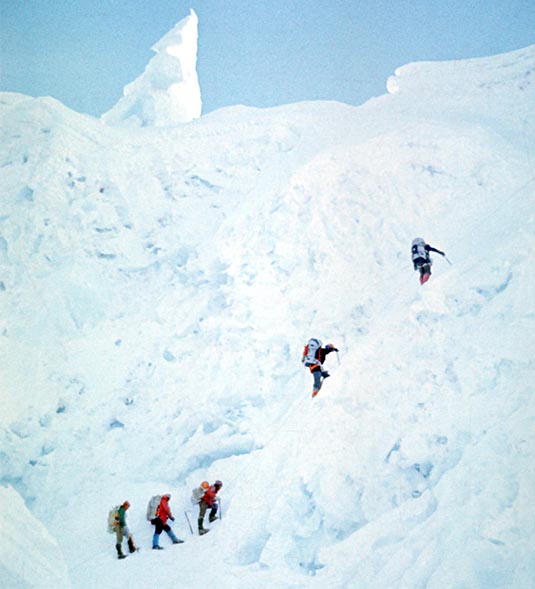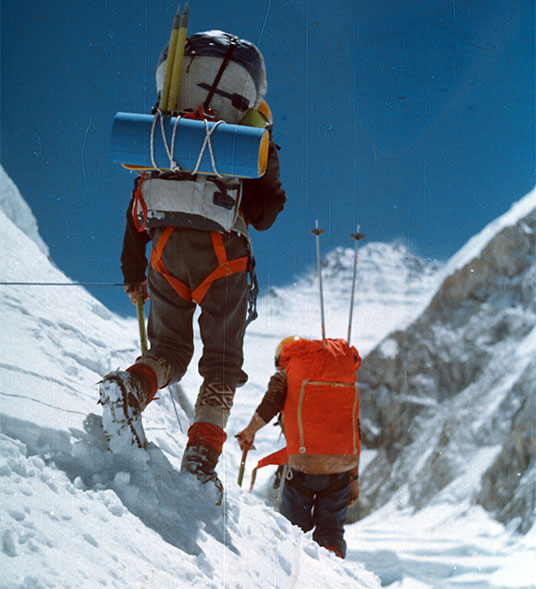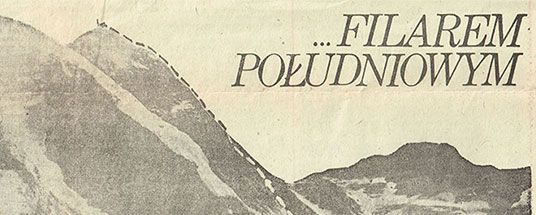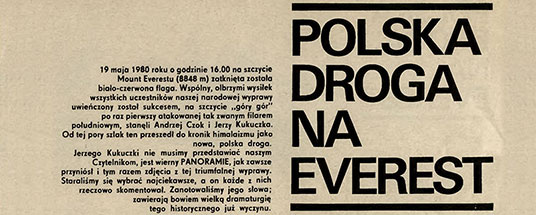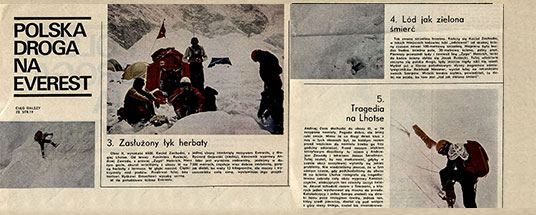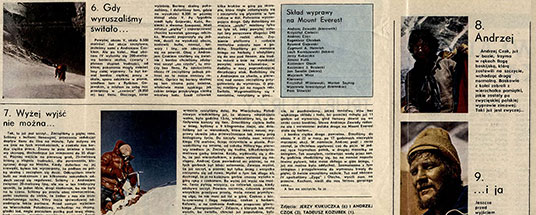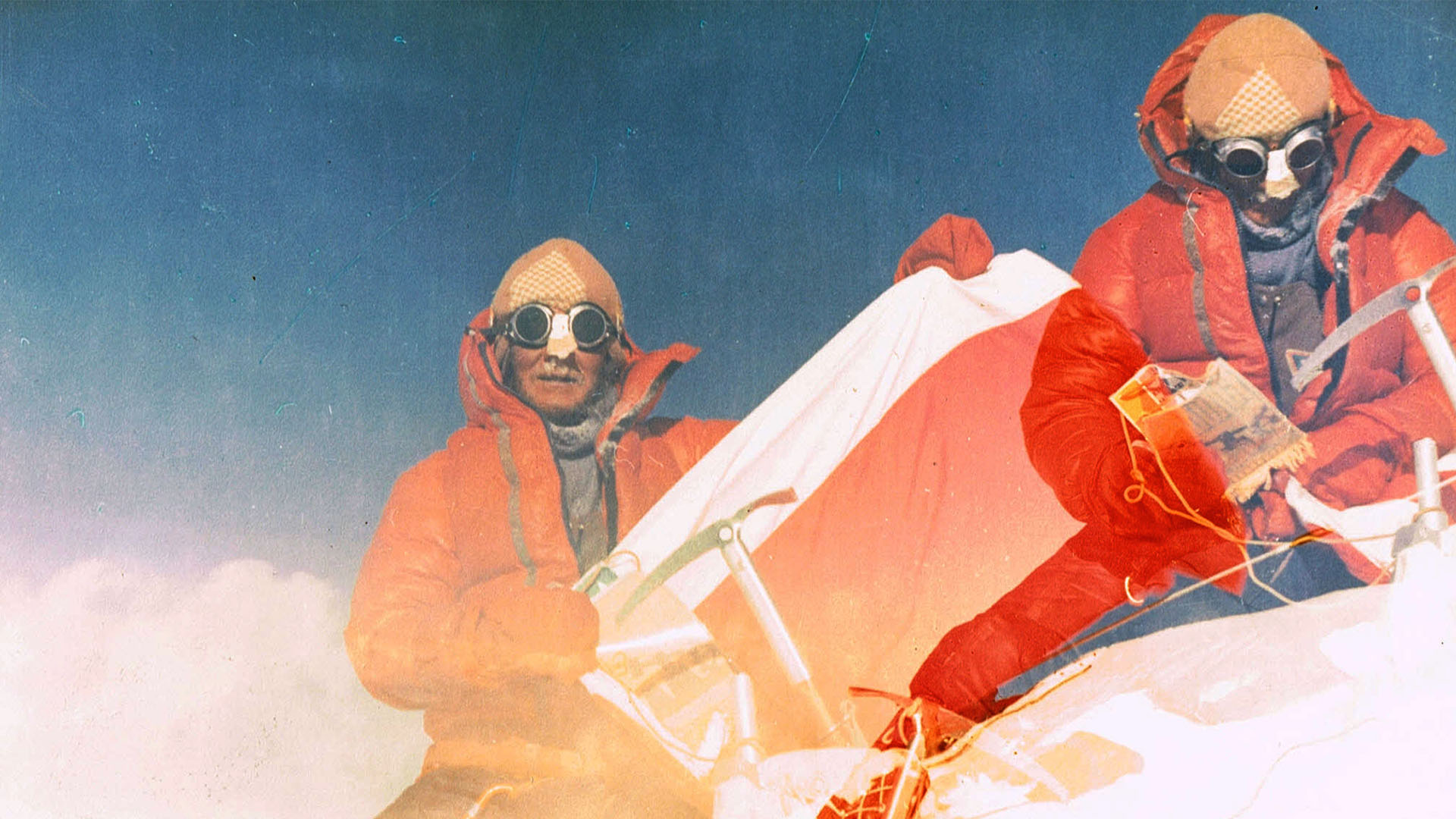Z Warszawy zadzwonił do mnie Andrzej Zawada.
— Jurek, gratulacje! Mam dla ciebie propozycję. Czy nie pojechałbyś z nami na pierwszą w historii zimową wyprawę na Everest? Ruszamy za niecałe dwa tygodnie...
Dla mnie był to bardzo ważny telefon. Świadczył o tym, że ktoś przekonał się, że potrafię wyjść na wysoką górę. W domu zastałem jednak skomplikowaną sytuację. Celina jest w zaawansowanej ciąży, ma rodzić w początkach stycznia, poród może nie być łatwy.
Trzymam przy uchu słuchawkę, w której słyszę słowa Andrzeja. Nie odpowiadam nic. Słucham i myślę.
Everest zimą, ten sam, pod którym byłem zaledwie kilka tygodni temu, ale nie miałem prawa nawet go dotknąć. Taka okazja może się nie powtórzyć...
Głos Andrzeja nie milknie, zaczynam się łamać. Odkrywam w tym potoku słów jednak szansę. Bo Andrzej chce robić również wyprawę na Everest wiosną. To znaczy najpierw zimą, ale chce w pełni wykorzystać cały sprzęt przyniesiony z mozołem pod najwyższą górę świata i zaatakować ją jeszcze raz. Mówię więc:
— Słuchaj. Z zimowej wyprawy rezygnuję, ale na wiosnę jestem pewnym kandydatem. (...) Inaczej nie mogę... Odkładam gorącą i wilgotną od potu słuchawkę.
Obóz zakładamy pod barierą skalną, która jest zasadniczym problemem naszej polskiej drogi na Everest. Jest wysoka, prawie pionowa i znajduje się na wysokości ponad 8 tysięcy metrów. I trzeba ją pokonać. Kolej na mnie i na Ryśka Gajewskiego. Udaje nam się przemęczyć najcięższy fragment tej bariery. Długo później stwierdziłem, że był to najtrudniejszy odcinek, jaki kiedykolwiek pokonywałem w Himalajach. W tatrzańskiej, sześciostopniowej skali trudności ten fragment zasługuje na piątkę — to znaczy: "nadzwyczaj trudno". Zrobienie go na tej wysokości kosztowało mnie tak dużo siły, że w pewnym momencie z wysiłku najzwyczajniej... zlałem się w spodnie. Chwilami ciemniało mi w oczach. Chodziło o 8-10 metrów pionowej skały. Zrobiliśmy cały wyciąg, 40 metrów miejscami trudniejszych, miejscami łatwiejszych, chociaż ogólnie bardzo trudnych. Jednak o wszystkim decydowało właśnie te 8–10 metrów. Były przełamaniem się przez całą barierę i otwierały dojście na bliski już stąd śnieżny stok (...) gdzie ma powstać obóz V. Ostatni.
Nie padło jeszcze ani słowo na temat najważniejszy:
Kto ma to zrobić?
Właściwie osiem, może nawet dziewięć osób ma szanse wejścia na szczyt. (...) A my z Andrzejem jesteśmy w tym gronie młodzieżą. Mamy na swym koncie Lhotse, ale tutaj już nie raz słyszeliśmy:
— Lhotse? Łatwa góra. Każdemu może się raz udać. (...)
Nikt tego nie powiedział wprost, nikt ostentacyjnie nie traktował nas z góry, ale jasne było jedno, właściwie dominowało:
"Spokojnie chłopcy. To my mamy tutaj pierwszeństwo...."
Tak to w każdym razie odbieraliśmy.
Powoli jednak z tego potoku słów wyłania się coraz częściej to, co mówi Zyga Heinrich. Mówi spokojnie. Opiera się nie tyle na samym fakcie uznanego autorytetu, ile na argumentach. A Zyga wie, że dotychczas w pracy na tej górze byliśmy z Andrzejem najbardziej aktywni. Docenia to. Szmer w mesie znowu słabnie. Czasem tylko można usłyszeć westchnienie i wyczuwalną nutkę rezygnacji. Andrzej Zawada przez cały czas tylko się przysłuchuje. Zbliża się moment, w którym musi przyjść kolej na niego. Wszyscy kierują wzrok w jego stronę.
— Uważam — jego słowa padały w absolutną ciszę... — uważam, że jako pierwsi powinni pójść Kukuczka z Czokiem, bo mają najlepszą kondycję, są w sztosie. A za nimi, jako drugi zespół, Heinrich i Olech, bo im się to należy. Idziecie w czwórkę.
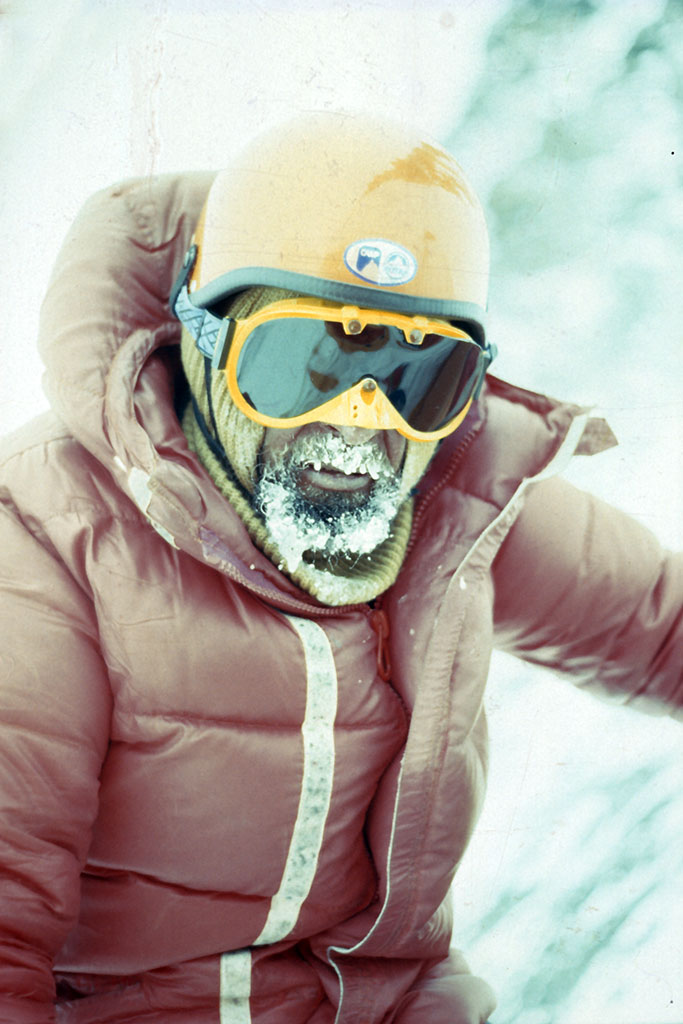
Zygmunt Andrzej Heinrich (1937 – 1989)
Partner wspinaczkowy Jerzego Kukuczki. Wspólnie stawali na szczycie Lhotse, Cho Oyu, oraz Nanga Parbat. Zginął podczas wyprawy na Everest 1989r.
Zyga, którego znałem z wielu wypraw, to człowiek będący ważną cząstką historii polskiego alpinizmu i himalaizmu. Ma na swoim koncie chyba największą ilość ekspedycji, jednak rzadko stawał na szczycie. Jest typowym człowiekiem gór, może żyć w nich chodząc między drugim a trzecim obozem, przeświadczony przy tym, że rzetelnie wykonuje swoją robotę, która mu sprawia satysfakcję. Zawsze mu brakowało, tak w każdym razie ja go oceniałem, tej pełnej ambicji ciągnącej do wierzchołka góry. I zawsze uważałem, że do swojej obecności w górach podchodzi trochę zbyt ostrożnie. Brakuje mu tej szczypty luzu, która pozwala w najważniejszych momentach zawyrokować: "Zaryzykuję ten paznokieć, żeby wejść".
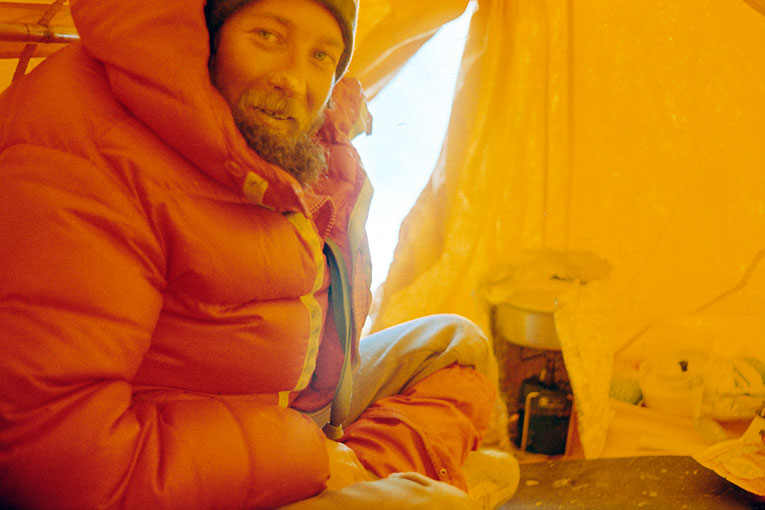
Andrzej Czok (1948 - 1986)
Partner wspinaczkowy oraz przyjaciel Jerzego Kukuczki. Wspólnie zdobywali Lhotse, Everest, Dhaulagirii. W roku 1986 podczas kolejne wspólne wyprawy na Kanghenjungę Andrzej Czok umarł na spowodowane chorobą wysokościową zapaleni płuc.
"Było wiadomo, że to ja z Andrzejem będziemy pierwsi pokonywali ostatni odcinek drogi na szczyt. To my byliśmy tam, bardzo wysoko, na tyle długo, że wiedzieliśmy na pewno jedno: Trzeba się śpieszyć.
Zyga nie protestował. Stanęło na tym, że idziemy w czwórkę."
Na szczycie jesteśmy dopiero o godzinie 16.
Łączymy się z bazą. Są zaniepokojeni, bo ostatni znak życia daliśmy z Wierzchołka Południowego. Zostawiliśmy ich wtedy z tym samym pytaniem, które postawiliśmy sobie: Iść w kierunku szczytu czy schodzić, bo nie mamy już tlenu? Potem ruszyliśmy jednak w górę, bo doszliśmy do wniosku, że od tej pory jest to już wyłącznie nasza sprawa. Nasze płuca, nasze wirujące przed oczami ciemne płaty, nasze być albo nie być. Oni, na dole, nie naciskali, oni od początku byli przeciwni robieniu tej największej góry bez tlenu. Co przeżywali od chwili, kiedy na Wierzchołku Południowym powiedzieliśmy to ostatnie, kończące zawsze łączność słowo "over" — nie dowiemy się. Możemy tylko domyślać się tego teraz, gdy łączymy się ponownie, dyszymy, potwornie dyszymy, że jesteśmy na szczycie. A w ich słowach, płynących z tak niska, słychać nie tylko gratulacje, radość, ale i ulgę. I tylko jakby przez echo tych słów dociera do mnie, że rzeczywiście coś się stało, że mam pod stopami najwyższą górę świata. "Over..."



